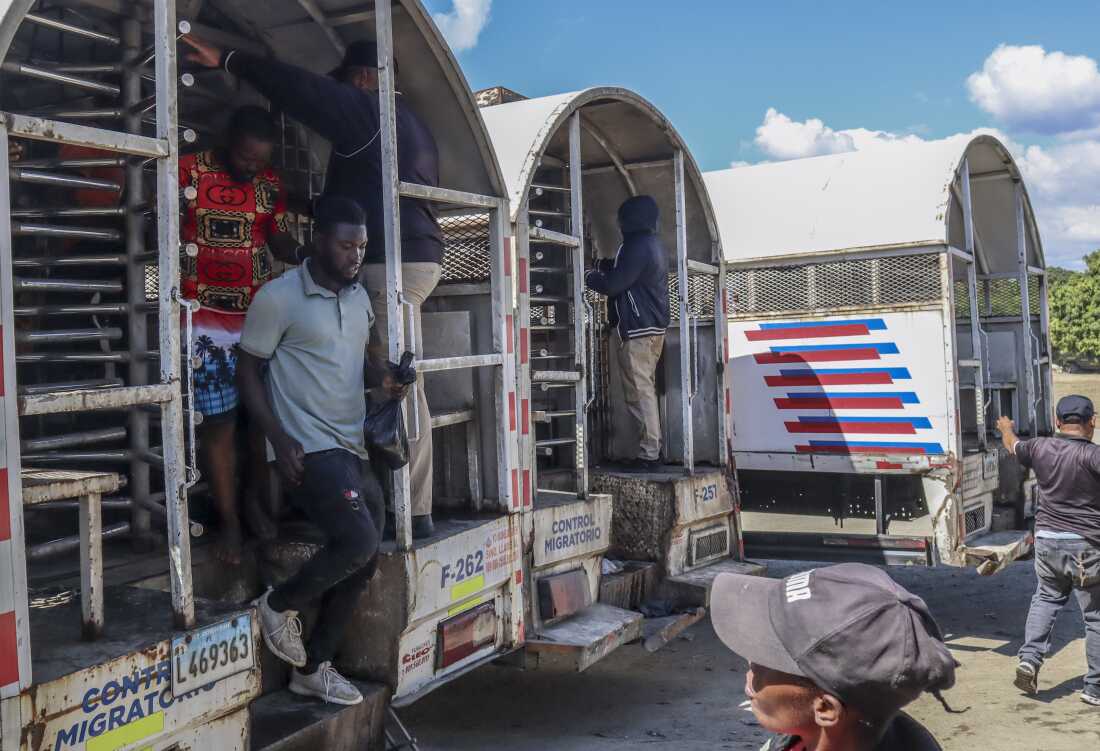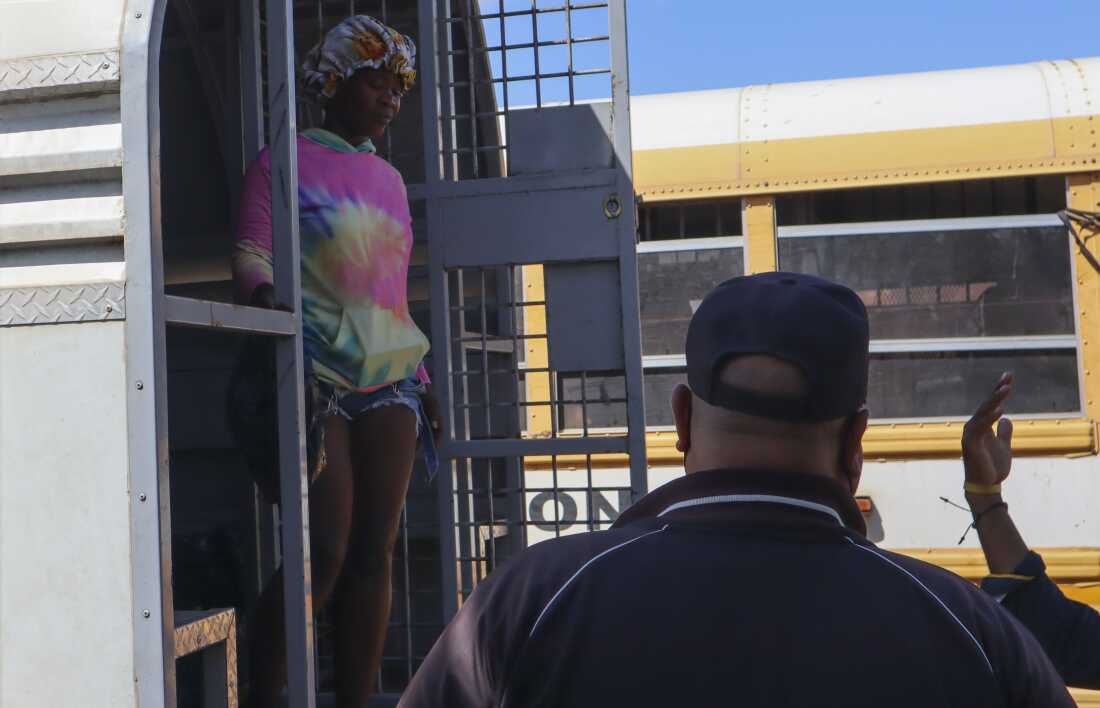
Haitians deported from the Dominican Republic get out of vans in Carrizal, Dominican Republic, on the border with Haiti on Jan. 30.
Martin Adames/AP
disguise caption
toggle caption
Martin Adames/AP
BELLADERE, Haiti — A crowd of 500 descended from dusty vans on a latest morning and shuffled by way of a tiny hole in a border gate separating Haiti from the Dominican Republic.
They had been the primary deportees of the day, some nonetheless clad in work garments and others barefoot as they lined up for meals, water and medical care within the Haitian border metropolis of Belladère earlier than mulling their subsequent transfer.
Beneath a broiling solar, the migrants recounted what they stated had been mounting abuses by Dominican officers after President Luis Abinader ordered them in October to begin deporting not less than 10,000 immigrants every week underneath a harsh new coverage broadly criticized by civil organizations.
“They broke down my door at 4 in the morning,” stated Odelyn St. Fleur, who had labored as a mason within the Dominican Republic for 20 years. He had been sleeping subsequent to his spouse and 7-year-old son.
The variety of alleged human rights violations starting from unauthorized house raids to racial profiling to deporting breastfeeding moms and unaccompanied minors is surging as officers ramp up deportations to Haiti, which shares the island of Hispaniola with the Dominican Republic.
Greater than 1 / 4 million individuals had been deported final yr, and greater than 31,200 in January alone.
“The situation has reached a critical point,” stated Roudy Joseph, an activist who accused officers of ignoring due course of throughout arrests. “Every day, children are left abandoned at schools.”

Haitians line up at a non-profit assist middle to obtain meals after being deported from the Dominican Republic, in Belladere, Haiti on Jan. 30.
Danica Coto/AP
disguise caption
toggle caption
Danica Coto/AP
‘I will anticipate you on the opposite facet’
On a latest afternoon, dozens of distributors lined up on both facet of the lads, girls and unaccompanied youngsters who marched single file into Belladère after being deported, their ft sinking right into a muddy, garbage-strewn path that smelled of urine.
The lads tried to promote them denims, water, SIM playing cards and unlawful journeys again to the Dominican Republic: “Would you like to pass through? I’ll wait for you on the other side,” they whispered in Creole.
Regardless of the crackdown, many re-enter the Dominican Republic, exposing a damaged system.
That afternoon marked the second time Jimmy Milien, a 32-year-old flooring installer, was deported. He was arrested within the capital, Santo Domingo, in 2024 and once more in mid-January when authorities boarded a public bus and pointed at him.
“Damn devil Haitian, get off,” he recalled them saying earlier than they even requested for paperwork.
He left behind his spouse and two youngsters, ages 3 and 12, and does not know when he’ll see them once more.
He was planning to journey to Haiti’s capital, however like 1000’s of others dropped off in Belladère, he must cross by way of gang territory the place gunmen open hearth on public transport.
“There’s no food, there’s nothing, only criminals,” he stated of Haiti, the place greater than 5,600 individuals had been reported killed final yr, the bulk by gangs that management 85% of the capital, Port-au-Prince.
If Milien had been to return a 3rd time to the Dominican Republic, dozens of smugglers await.
Mack, a Haitian who solely gave his first title to talk freely about smuggling, stated he ferries migrants throughout the border as much as six instances every week.
He fees $3 per individual, after which gives $8 to Dominican border guards: “If you pay them, they will let you through,” he stated.
He lived nearly three years in Santo Domingo, putting in drywall till he acquired deported. He then joined a thriving smuggling operation and stated he does not plan on returning to the capital till the crackdown eases.
“Here, everyone knows me,” he stated. “They don’t bother me.”

Haitians deported from the Dominican Republic get out of vans in Carrizal, Dominican Republic, on the border with Haiti on Jan. 30.
Martin Adames/AP
disguise caption
toggle caption
Martin Adames/AP
Younger and alone on the border
Navy checkpoints dot the street main out of the dusty border to the Dominican capital. Authorities board buses, stick their heads into automobile home windows and detain suspected undocumented migrants, however many bounce out earlier than a checkpoint and hop on once more additional down the street.
The inflow of Haitian migrants and their makes an attempt to re-enter illegally is one thing that vexes Vice Admiral Luis Rafael Lee Ballester, Dominican migration director.
“The Dominican Republic…has taken too much responsibility for the situation in Haiti,” he stated. “We are willing to provide support, but it’s important that Haiti’s leaders instill order in their country, that they look after their people.”
Dominican officers argue that Haitian immigrants have overburdened the nation’s public companies, with greater than 80,000 new Haitian college students enrolled in public faculties previously 4 years. Well being officers say Haitian girls account for as much as 70% of births within the nation, costing the federal government tens of millions of {dollars}.
Ballester stated he’ll deploy extra migration officers throughout the nation to sort out what he described as a surge in undocumented immigrants, saying they seem to be a burden and a hazard to his nation.
Whereas he denied abuse allegations, he acknowledged officers are allowed to enter houses “during a hot pursuit” and that personnel are being retrained “because our commitment to respecting human rights is unquestionable.”
Ballester stated the Dominican Republic doesn’t deport unaccompanied minors and that officers now separate girls and kids from males throughout deportations.
However in late January, 5 youngsters with out their dad and mom had been deported. Amongst them was Jovenson Morette, 15, who stated he was detained whereas working in a discipline.
He and the 4 others had been interviewed by Haitian officers in Belladère who had been making an attempt to trace down their dad and mom.
Additional north, within the Haitian border city of Ouanaminthe, a 10-year-old unaccompanied woman was deported in late January, stated Geeta Narayan, UNICEF’s consultant in Haiti.
“These children are amongst the most vulnerable,” she stated, noting that gangs alongside the border prey on them.
Final yr, the Dominican Republic deported 1,099 unaccompanied youngsters; 786 of them had been reunited with their households, in line with UNICEF.
Josette Jean, 45, feared for her 16-year-old son, who was born within the Dominican Republic, when he was not too long ago deported alone to Haiti.
Clutching an image of him, she stated she rushed to the Dominican detention middle the place he was being held however was instructed the federal government does not deport unaccompanied minors. He was deported anyway.
Jean paid a smuggler to convey her son again to the Dominican Republic days later.
“Children who are born here have no idea where to go,” she stated of these deported to Haiti, a rustic her son had by no means visited.
A big variety of these deported, like Jean’s son, had been born within the Dominican Republic however lack start certificates or different official documentation proving their authorized standing, with activists accusing the federal government of permitting work permits to run out or refusing to course of their paperwork. The Dominican Republic doesn’t robotically bestow citizenship to everybody born there.
As mass deportations proceed, Dominican employers within the agriculture and building industries are complaining.
Ballester’s response? Rent Dominican employees.

A Haitian deported from the Dominican Republic will get out of a truck in Carrizal, Dominican Republic, on the border with Haiti on Jan. 30.
Martin Adames/AP
disguise caption
toggle caption
Martin Adames/AP
‘Haiti is drowning’
At the very least one mobile phone was recording when Mikelson Germain, 25, tried to evade Dominican authorities late final yr. He was operating on a roof when an official caught him and pushed him off it. The girl recording shrieked and began crying, pondering he was lifeless.
“By the grace of god, I fell on an electrical wire first,” Germain stated in a video taped by a nonprofit group.
Together with his leg injured and his cousin’s youngsters holding on to him, Germain stated authorities left the scene.
Activists accused the official of tried homicide, however regardless of the widespread outcry, they are saying abuses persist.
Final yr, a bunch of Dominican males, outraged at what they stated was the therapy and arrests of their Haitian neighbors, threw rocks, bottles and different objects at authorities. One man tried to disarm a migration official earlier than pictures had been fired and everybody scattered.
As mass deportations proceed, President Abinader warned Haiti’s scenario is a hazard to the area and that there could possibly be an “uncontrollable wave of migration” as he known as for extra assist for a U.N.-backed mission in Haiti struggling to battle gangs.
“There is no Dominican solution to the Haitian crisis,” he stated. “Haiti is drowning while an important part of the international community watches passively from the shore.”





